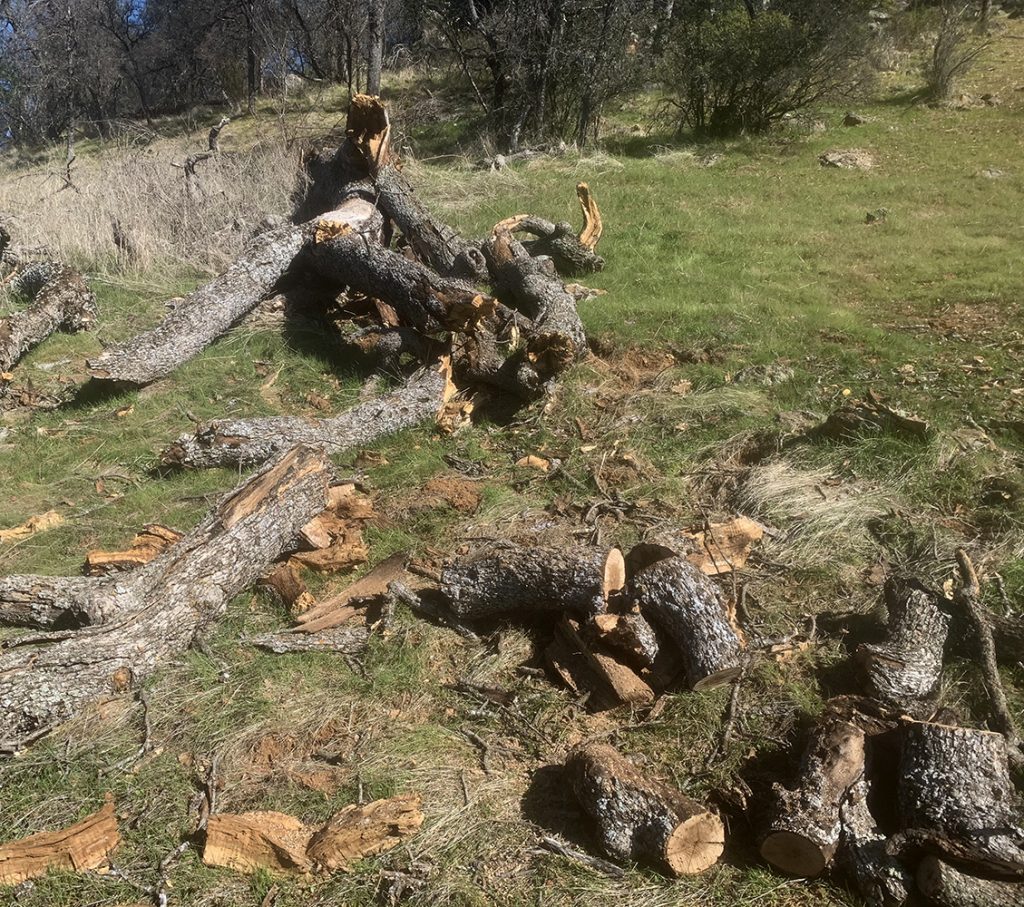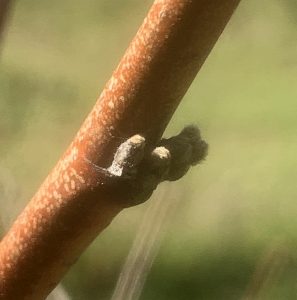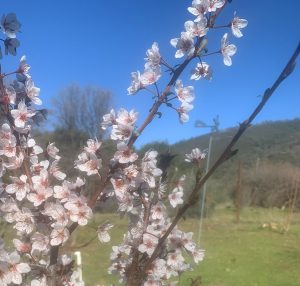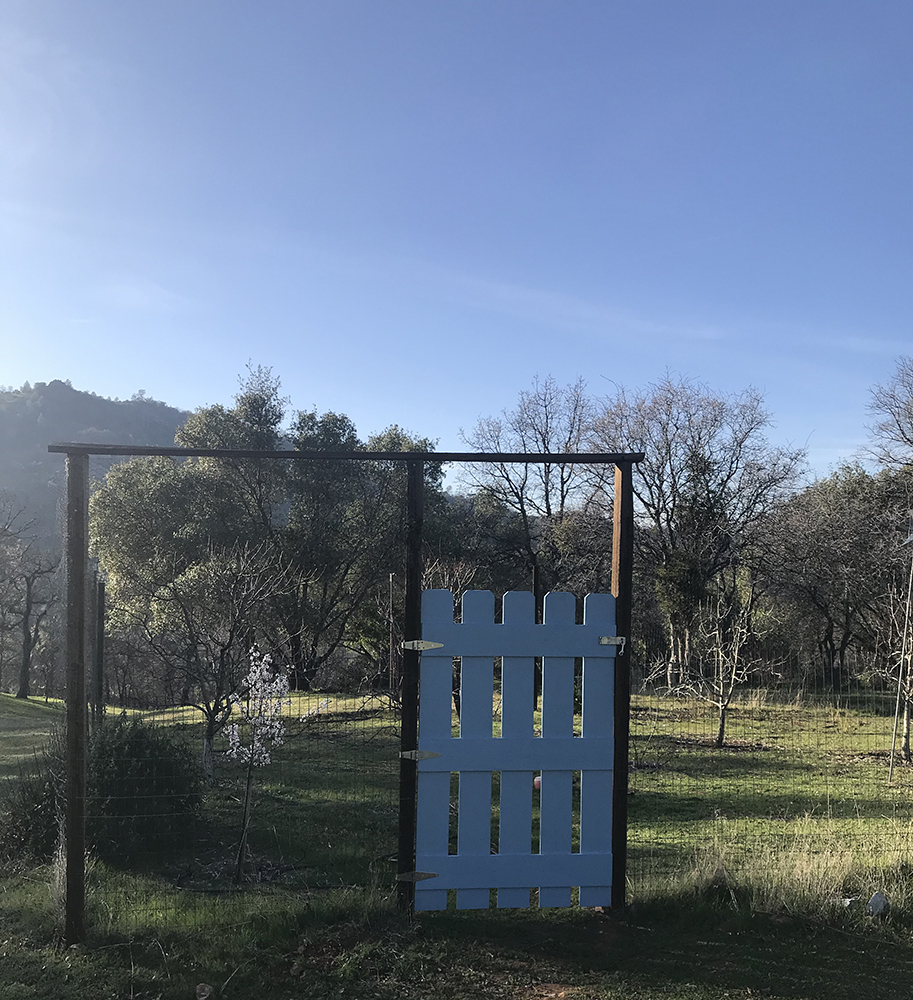
Two weeks ago we had ferocious windstorm. Two majestic oaks (albeit already dead) crashed to the ground. The PVC pipe that feeds our rainwater cistern broke off and the orchard gate blew down. Fixing the gate, which was already falling apart, had been on my “to do” list for a year. Now I couldn’t ignore it.
The ten small trees in the orchard give us peaches, apricots, pears and apples in the late summer. There are also blackberries, raspberries, a tiny plum tree, and three struggling blueberry plants that I planted last year. We inherited the orchard when we moved to this house and land in 2016. As a city boy, I knew absolutely nothing about trees and plants. I learned.

In the dormant winter months I prune the trees. I spray them with a solution to prevent scale and leaf curl. I weed the circle of earth around each trunk, mix steer manure into the soil and mulch with wood chips. Sometime in March or April I will turn on the irrigation system, clear the line filters, put new batteries in the water timers, and fix breaks in the lines.
In our first two years here I was stingy with the water. Last year I increased the flow and we were rewarded by an abundant harvest. In May I will weed wack the tall grass that will have grown up around the trees. In June as the trees are fruiting, I will hang red and silver scare tape from limbs to ward of the birds which would otherwise peck holes into every pear, peach and apple. In the first year I tried netting the trees, but small birds got caught in the nets and died.
Now when I least want to do it, I have to fix the gate. What I really wanted to do is get back to work on editing The Restless Hungarian film, which I was last deeply engaged with just a month ago, in France. I miss it terribly. But without the gate and the eight-foot high wire fence, the trees would not survive the depredations of the deer. They go for anything that is green and watered in the dry summer months.

I think of myself as a filmmaker and writer, not a farmer. Yet the orchard has somehow captured me, obliging me to tend it through the seasons. Why is this? A real farmer would have a good laugh. My peaches must be the most expensive in the world.
Lately I have been thinking a lot about something that I call “the mysterious unfolding of reality.” For all the narratives that assail me, either externally or internally, I cannot know the future. What happens is rarely what my imagination prepares me for. Is it the same with you? I think that most of us expend a lot of energy on what may, or may not, happen. In order to be well poised to deal with calamity, we continually strive to “get ground under out feet” as Pema Chodron puts it, to be in a secure place, or rather a place that give us the illusion of security. I see that this anxiety, my pre-occupation with getting ground under my feet, often makes me blind to the mysterious unfolding of reality.
So, what does all this have to do with the orchard gate? The gate shattering in the windstorm was irrefutable reality. I cursed it, but it needed attention. Resentful at first, I tended to it. But as I worked on the gate, it became the thing that I was doing. I carefully disassembled the pine wood slats and glued them together in stages. It took three days since I only had enough clamps to glue one section at a time. I filled all the holes with putty, rough-sanded the whole thing, painted it with some left-over sky-blue paint I found in the garage, and replaced the small screws on the hinge flanges with solid ¼” bolts.

I feel satisfaction. The orchard is, literally, the ground under my feet. The fruit will be protected from deer for another season. The past couple of mornings Sharon and I have walked out to admire the gate, which looks like a small patch of blue sky set down upon the earth.
Soon I can go back to work on The Restless Hungarian.
Sarah B Broadbent
March 7, 2020 at 10:26 pmLove this.
I am reviewing your book for my book club.
Pivotal work, and can’t wait for the film.
Holly
March 4, 2020 at 2:02 pmWhat a pretty gate! Your experiences managing the property sound very familiar to me. Our place, too, has its own timeline of needs, which often seem out of whack with my own desires of how to I’d like to be spending my time (those guitar scales are not going to get learned by magic!). Soon it will be time to weed-eat everything, and weed-eating will be the last thing I feel like doing. However, I know that once I start the work, I will actually enjoy it. And the satisfaction of the completed work is always wonderful.
So why do I have to work so hard to overcome my reluctance to do something I know I’ll ultimately enjoy? Humans are weird.
I hope you and Sharon are having a sweet time being back in America. 🙂
Andras Szurdi
March 4, 2020 at 4:28 amNice gate and a lovely way of thinking/writing. Thank you.
Ivan
March 4, 2020 at 2:06 amDear TOM,
If your peaches are the most expensive in the world, this is all the more reason to cherish your trees and really savor the sublime taste of this fruit which owes its flavor to your kind care!
The destruction by the storm of the door of your orchard-paradise, your annoyance, the repair of the door, the appeasement that the acceptance of the situation suggested to you, the wink that you send to the storm by painting the door in sky-blue, I really like all this.
I love your text, it is full of sensitivity and poetry.
Friendships
Ivan, Nice, France
maryann
February 27, 2020 at 6:43 pmLoved this, Tom. Oh so familiar to our lives here. Things need to be tended to when they need to be tended to rather than when we make plans for them in the future that seems to be comfortable for us. But how rewarding it all is when we are simply doing what we do in these lives that are so nurturing to our souls. Thanks for this and things to come. Feels good to have you back here a bit closer to us.
Christopher
February 27, 2020 at 8:34 am“Depredations:” Serge Chermayeff’s favorite word❗️
I envy you your orchard❗️
Love to you both from Cuernavaca,
Christopher
Judy Peck
February 26, 2020 at 6:52 pmI love your gate and your connection with your fruit orchard, enjoy the experience. The connection is simplistic yet very profound, it renews my belief in something beyond us.
Hannah
February 26, 2020 at 5:22 pmHi Tom,
I loved this segment. It reminds me of a wonderful film that we just saw. It’s called the Biggest Little Farm:
https://en.wikipedia.org/wiki/The_Biggest_Little_Farm
and it has some of the same feelings that you express in the orchard gate.
Best,
Hannah